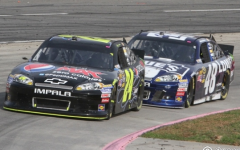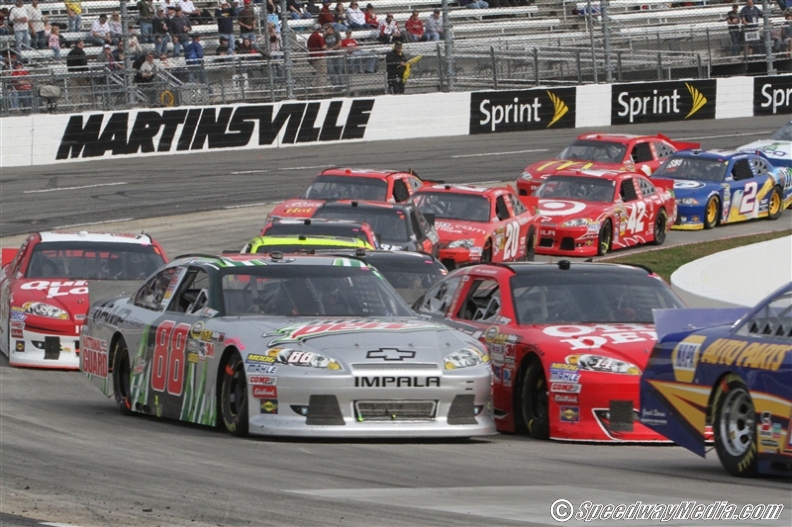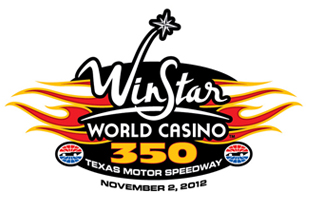[media-credit name=”Brad Keppel” align=”alignright” width=”240″] [/media-credit]Did anyone doubt that Jimmie Johnson would lead the Chase points after Martinsville? Earlier in the spring race, he and teammate Jeff Gordon were headed for a 1-2 finish before somebody got greedy and the result was Ryan Newman winning. Never mind that Hendrick Motorsports owns this place, and if for not a strange turn of events, HMS would have won both races at Martinsville Speedway. As usual.
[/media-credit]Did anyone doubt that Jimmie Johnson would lead the Chase points after Martinsville? Earlier in the spring race, he and teammate Jeff Gordon were headed for a 1-2 finish before somebody got greedy and the result was Ryan Newman winning. Never mind that Hendrick Motorsports owns this place, and if for not a strange turn of events, HMS would have won both races at Martinsville Speedway. As usual.
The only driver and team that have a chance against the Hendrick superstars is Denny Hamlin. Trouble was that Hamilton had electrical and pit speed problems that gave him little chance of winning on Sunday. These days, you can forget anyone else challenging. Despite that one thing, it was a good race and in fact competitive. Brian Vickers, who had qualified second, was competitive all day. Clint Bowyer was up front for the entire race. Even Jeff Gordon looked invincible at times, but in the end, everyone in the stands, even though many were scared off by Storm Sandy and the warnings of the Virginia Governor, knew that Johnson would be celebrating at the race’s end. It’s been that way for years. Those guys, led by Chad Knaus just have the Paper-Clip figured out, but that didn’t mean that it was a boring race. It was far from that.
Martinsville, the oldest track on the NASCAR Sprint Cup circuit, has become the showplace of what NASCAR is and what it should be. While track owners and corporations continued to build their mile and a half palaces, isn’t it funny that the best racing is always on shorter tracks? Sunday saw lead changes and spirited back and forth among several drivers. No fuel mileage problems here. Just hard racing was on the menu from start to finish. The race didn’t give fans any time to fall asleep or wander to another NFL game, if they were at home. Even the finish held some drama as Kyle Busch tried unsuccessfully tried to run down and pass Johnson. Compare that with other races this season.
It’s really interesting to note that a track designed in 1947 provides the best racing on the circuit. No progressive banking and nothing to take away from the racing like casinos or other distractions. Sue, the end result was what everyone figured would happen, but fenders were put on opponents and no car got so far out in front that no one could pass them. It was the perfect race and that’s as it should be.
So, as far as I can see, the twice annual “Hendrick Invitational” should be the blueprint of what NASCAR should be. For too long, the sport has tried to emulate stick and ball sports. We now have a playoff system where the championship is the end all. If you find yourself in the top 12 before the playoffs, you get all the attention. The only problem is that in the other sports, only the playoff teams are playing. In NASCAR, the other 31 teams still compete, but go largely unnoticed. From Daytona to Homestead, the points are the only story. Who cares who wins a race? In the NFL or MLB, that works because you have a game that never changes. Everything changes in the Chase. Thou shalt not touch the Chase contenders. No one paid any attention to that, that I could see at Martinsville, but that is the exception. As we head to the final three races at tracks larger than Martinsville, that may come into play and that’s unfortunate. On Sunday, as I sat in the Press Box, I was rooting for anyone who was in the Dirty Dozen to win. It didn’t happen, but not for lack of effort. On a larger track, it might be hard to see that. Isn’t it time to see more of that?
Regardless, last Sunday was a joy if you enjoy good racing. Thank goodness that tracks like Martinsville still exist after 65 years, and isn’t it time that we see more of that? The trend to go to larger tracks and less unique tracks (I hear Darlington and Rockingham calling) has led to the lack of television ratings and attendance, in my opinion. Folks want to see action, and they got it at Martinsville. Long may the little track in the small town somewhere between Roanoke and Greensboro continue to flourish. It’s the crown jewel of NASCAR.







I agree that short tracks are what Nascar needs instead of all these cookie cutter 1.5 – 2.0 mile tracks.
As for the new Kern County track, and Irwindale as well, neither will work as a Cup venue (based on seating / expansion room, parking availability, freeway access and local amenities), although I do think a Truck series race (with a K&N West Series race as a support race) could happen at either track, however, the lack of SAFER barriers and pit road issues might have to be overcome. I’d love to see this happen for both tracks. And with the Truck series already heading out West at least twice a year (Las Vegas & Phoenix), this could be arranged to be somewhat affordable for the teams.
Short tracks and road courses in greater numbers are what is needed for Cup to re-ascend in significance.
Iowa is a perfect case in point–but I’m sure NASCAR thinks their investment in Kansas would be threatened by Iowa picking up a Cup date.
There’s a new 1/2 mile track, Kern Co. Raceway Park, just being completed in the central valley near Bakersfield CA (right next to I-5), that SHOULD become “Bristol West”, but what are the odds? Very long, no doubt.
It’s not clear whether Irwindale could be re-configured (as far as seating/parking) to be a viable Cup venue. How about Cup at Milwaukee? That would be wild! Gresham Motorsports Park in Jefferson GA is another “old school” track that could host a Cup event, with proper investment in improvements–again, seating considerations would limit just how far this could go. Certainly Rockingham, North Wilkes, and even the old Nashville Fairgrounds offered the kind of racing that Martinsville represents, and is sorely missed in NASCAR at the top level today.
And, besides the former Cup venues mentioned, look what’s sitting idle–Nashville Superspeedway, Gateway, and Pikes Peak, for starters.
All for cookie-cutter 1.5 mile tracks. It was always about seats, but that has proven to be a bad recipe for success.
There are plenty of other possibilities–and the “show” really doesn’t care how many seats are available, since TV money is where the greatest amount of revenue comes from now. The smaller tracks cost less to build, so that’s a bonus.